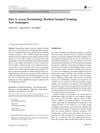Academic Pathways to a Practice in Facial Surgery
January 2018
in “
Georg Thieme Verlag eBooks
”

TLDR There are several educational routes to become a facial surgeon, each with different specializations and fellowships.
The document outlines various educational pathways to becoming a facial surgeon, emphasizing that there is no single best route, but rather several options that aspiring surgeons can consider based on their personal and professional goals. The five primary pathways mentioned are: 1) Otolaryngology-head and neck surgery with a post-residency fellowship in facial plastic and reconstructive surgery, 2) Plastic surgery with a residency in a related field and possibly a post-residency fellowship in facial plastic and reconstructive surgery, 3) Ophthalmology with a post-residency fellowship in oculoplastic surgery, 4) Dermatology with a post-residency fellowship in procedural dermatology or Mohs's surgery, and 5) Oral and maxillofacial surgery with a post-residency fellowship in cosmetic surgery of the face, head, and neck. The document also discusses the importance of board certification and the need for continuous education and skill development in the field of facial surgery. It highlights the importance of having an eye for beauty and harmony, good interpersonal skills, attention to detail, and the ability to visualize outcomes as key characteristics for success in this specialty.


